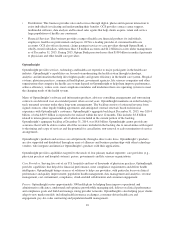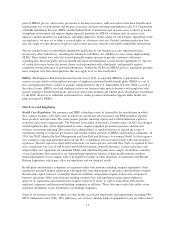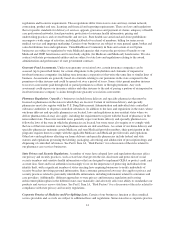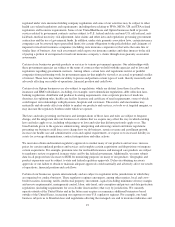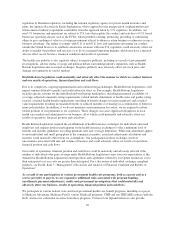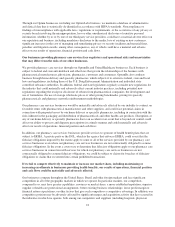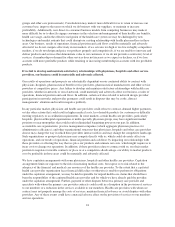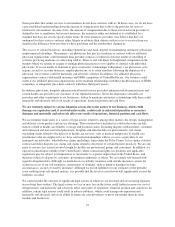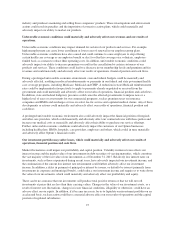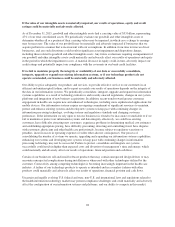United Healthcare 2015 Annual Report Download - page 22
Download and view the complete annual report
Please find page 22 of the 2015 United Healthcare annual report below. You can navigate through the pages in the report by either clicking on the pages listed below, or by using the keyword search tool below to find specific information within the annual report.regulation by Brazilian regulators, including the national regulatory agency for private health insurance and
plans, the Agência Nacional de Saúde Suplementar, whose approach to the interpretation, implementation and
enforcement of industry regulations could differ from the approach taken by U.S. regulators. In addition, our
non-U.S. businesses and operations are subject to U.S. laws that regulate the conduct and activities of U.S.-based
businesses operating abroad, such as the FCPA, which prohibits offering, promising, providing or authorizing
others to give anything of value to a foreign government official to obtain or retain business or otherwise secure a
business advantage. Our failure to comply with U.S. or non-U.S. laws and regulations governing our conduct
outside the United States or to establish constructive relations with non-U.S. regulators could adversely affect our
ability to market our products and services, or to do so at targeted operating margins, which may have a material
adverse effect on our business, financial condition and results of operations.
The health care industry is also regularly subject to negative publicity, including as a result of governmental
investigations, adverse media coverage and political debate surrounding industry regulation, such as Health
Reform Legislation and associated exchanges. Negative publicity may adversely affect our stock price and
damage our reputation in various markets.
Health Reform Legislation could materially and adversely affect the manner in which we conduct business
and our results of operations, financial position and cash flows.
Due to its complexity, ongoing implementation and continued legal challenges, Health Reform Legislation’s full
impact remains difficult to predict and could adversely affect us. For example, Health Reform Legislation
includes specific reforms for the individual and small group marketplace, including guaranteed availability of
coverage, adjusted community rating requirements (which include elimination of health status and gender rating
factors), essential health benefit requirements (resulting in benefit changes for many members) and actuarial
value requirements resulting in expanded benefits or reduced member cost sharing (or a combination of both) for
many policyholders. In addition, if we do not maintain certain minimum loss ratios, we are required to rebate
ratable portions of our premiums to our customers. These changes can cause significant disruptions in local
health care markets and adjustments to our business, all of which could materially and adversely affect our
results of operations, financial position and cash flows.
Health Reform Legislation required the establishment of health insurance exchanges for individuals and small
employers and requires insurers participating on the health insurance exchanges to offer a minimum level of
benefits and includes guidelines on setting premium rates and coverage limitations. While risk adjustment applies
to most individual and small group plans in the commercial markets, actual risk adjustment calculations and
transfers could materially differ from our assumptions. Our participation in these exchanges involves
uncertainties associated with mix and volume of business and could adversely affect our results of operations,
financial position and cash flows.
Our results of operations, financial position and cash flows could be materially and adversely affected if the
number of individuals who gain coverage under Health Reform Legislation varies from our expectations, if the
demand for Health Reform Legislation related products and capabilities offered by our Optum businesses is less
than anticipated or if our costs are greater than anticipated. For a discussion of individual exchange-compliant
products, see Part II, Item 7, “Management’s Discussion and Analysis of Financial Condition and Results of
Operations.”
As a result of our participation in various government health care programs, both as a payer and as a
service provider to payers, we are exposed to additional risks associated with program funding,
enrollments, payment adjustments, audits and government investigations that could materially and
adversely affect our business, results of operations, financial position and cash flows.
We participate in various federal, state and local government health care benefit programs, including as a payer
in Medicare Advantage, Medicare Part D, various Medicaid programs, CHIP and our TRICARE contract with the
DoD, and receive substantial revenues from these programs. Certain of our Optum businesses also provide
20


